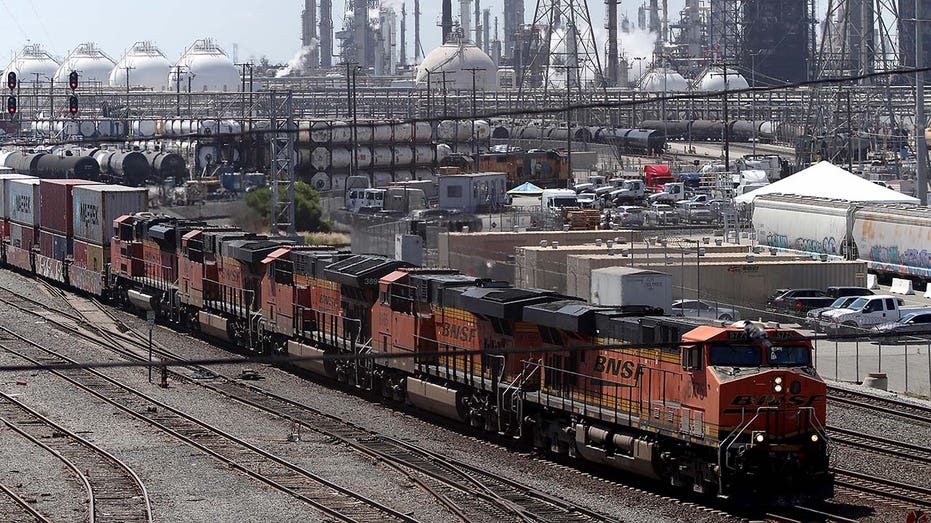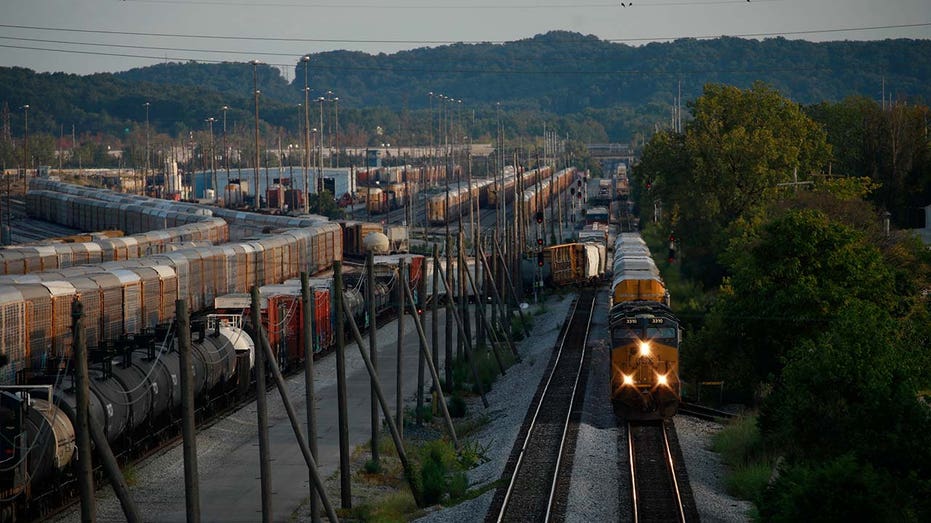Retail trade groups say a rail strike would be devastating to the economy
Both trade groups said a strike would also exacerbate inflation
Railroad companies 'disappointed' some unions rejected initial deal: Ian Jeffries
Association of American Railroads president and CEO Ian Jeffries says 6 out of 12 unions have agreed to the railroad worker contract negotiations.
Retail industry groups reacted Monday to the possibility of a rail strike happening in early December going up.
The Transportation Division of the International Association of Sheet Metal, Air, Rail and Transportation Workers (SMART-TD) announced Monday that member voting on the September agreement negotiated by President Joe Biden’s Presidential Emergency Board had returned split results. SMART-TD-represented yardmaster members voted in favor of contract ratification, whereas its train and engine service members rejected theirs, according to the release.
ANOTHER RAIL UNION REJECTS DEAL, ESCALATING STRIKE THREAT AHEAD OF THE HOLIDAYS
As of Monday, one-third of the twelve rail unions have voted against the agreement. That means a strike could potentially happen in early December, unless the railroads and unions reach a deal or Congress intervenes before then.

WILMINGTON, CALIF. - SEP. 14, 2022. A freight train rolls past an oil refinery in the Port of Los Angeles in Wilmington. A major railroad strike is looming that could paralyze the nation's supply chain and transportation rail service if both sides do (Luis Sinco / Los Angeles Times via Getty Images / Getty Images)
Jess Dankert, the vice president of supply chains at the Retail Industry Leaders Association, said in a statement a rail strike "would cause enormous disruption to the flow of goods nationwide, the effects of which would ripple through the supply chain and the U.S. economy at large."
National Retail Federation CEO Matthew Shay also said a strike during the holiday season would be "devastating for American businesses, consumers and the U.S. economy," according to a release from the trade association
Both trade groups raised concerns about a potential rail strike contributing to higher inflation.
"Fortunately, this year’s holiday gifts have already landed on store shelves," Dankert said. "But an interruption to rail transportation does pose a significant challenge to getting items like perishable food products and e-commerce shipments delivered on time, and it will undoubtedly add to the inflationary pressures already hitting the U.S. economy."

LOUISVILLE, KENTUCKY - SEPTEMBER 14 : CSX Transportation Inc. freight trains sit parked in a railroad yard ahead of a potential freight rail workers union strike in Louisville, Kentucky on Sept. 14, 2022. (Photo by Luke Sharrett for The Washington Post via Getty Images / Getty Images)
"American businesses and families are already facing increased prices due to persistent inflation, and a rail strike will create greater inflationary pressures and threaten business resiliency," Shay stated.
INFLATION HOLDS GRIP ON US ECONOMY IN OCTOBER AS PRICES REMAIN STUBBORNLY HIGH
Inflation has been hovering near multi-decade-high levels. In October, the consumer price index increased 0.4% month-over-month and 7.7% year-over-year, with categories like food, shelter costs and energy seeing their prices go up, according to Labor Department data released Nov. 10, FOX Business previously reported.
"Smooth and stable operations on the rails is absolutely crucial this holiday season and should not be derailed by a rejection of the contract," Shay continued. "The parties must work out the issues and ratify the contract without a disruption to the system. If not, Congress must step in to prevent a strike before the end of the cooling off period on December 8."

A worker boards a locomotive at a BNSF rail yard Wednesday, Sept. 14, 2022, in Kansas City, Kan. Business and government officials are preparing for a potential nationwide rail strike at the end of this week while talks carry on between the largest U ((AP Photo/Charlie Riedel) / AP Newsroom)
The RILA’s Dankert made a call for potential legislative action as well, urging Congress to "act quickly to codify the tentative agreement reached in September to ensure rails and the larger supply chain remain functional and open for business" in the event the railroads and unions don’t come to an agreement.
Other industries could suffer if a rail strike commences. When the threat of one previously loomed in September, Jason Miller – interim chairperson of the department of supply chain management at Michigan State University – told FOX Business the auto, chemical, energy and agriculture industries could be negatively impacted.




















